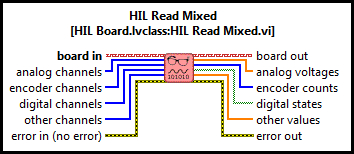
HIL Read (Mixed)

| Parent Polymorphic VI: | HIL Read |
| Requirements: | Quanser Rapid Control Prototyping Toolkit, LabVIEW 2020 or newer |
Description
Reads from analog, digital, encoder and/or other channels of a HIL board.
Required Inputs  All required inputs must be wired. They appear in bold text in the context help window for the VI.
All required inputs must be wired. They appear in bold text in the context help window for the VI.

|
board in is a reference to a HIL Board instance that represents the open HIL board. This input must be wired to a valid HIL Board signal, as generated by a HIL Initialize VI. |
Recommended Inputs  Recommended inputs need not be wired. They appear as simple text in the context help window for the VI.
Recommended inputs need not be wired. They appear as simple text in the context help window for the VI.

|
analog channels is an array of channel numbers indicating the analog input channels to be read. The voltages (or currents) read will appear at the analog voltages output. |

|
encoder channels is an array of channel numbers indicating the encoder input channels to be read. The values read will appear at the encoder counts output. |

|
digital channels is an array of channel numbers indicating the digital input channels to be read. The quantities read will appear at the digital states output. |

|
other channels is an array of channel numbers indicating the other input channels to be read. The values read will appear at the other values output. |

|
error in describes error conditions occurring before the VI executes. If an error has already occurred, the VI returns the value of the error in cluster in error out.
|
Outputs

|
board out is a copy of the HIL Board instance passed to the board in input. |
||||||

|
analog voltages is the analog voltages (or currents) read from the specified analog channels. |
||||||

|
encoder counts is the encoder counts read from the specified encoder channels. |
||||||

|
digital states is the states read from the specified digital channels. |
||||||

|
other values is the values read from the specified other channels. |
||||||

|
error out contains error information. If the error in cluster indicated an error, the error out cluster contains the same information. Otherwise, error out describes the error status of this VI.
|
Details
If any of the channels arrays are empty then those channels are not read. This VI allows a combination of different types of channels to be read at the same time. When mixed I/O operations are being performed, it is more efficient to use this VI than to include multiple VIs specific to each type of channel.
Feedthrough Behaviour
All input/output pairs of this function have direct feedthrough behaviour.
Examples
There are currently no examples
See Also
| HIL Write | Writes to analog, digital, encoder and/or other channels of a HIL board. |
Targets
|
Target |
Supported |
Comments |
|---|---|---|
|
Yes |
Fully supported. |

Copyright © Quanser Inc. This page was generated 2021-09-24. Submit feedback to Quanser about this page.
Link to this page.





